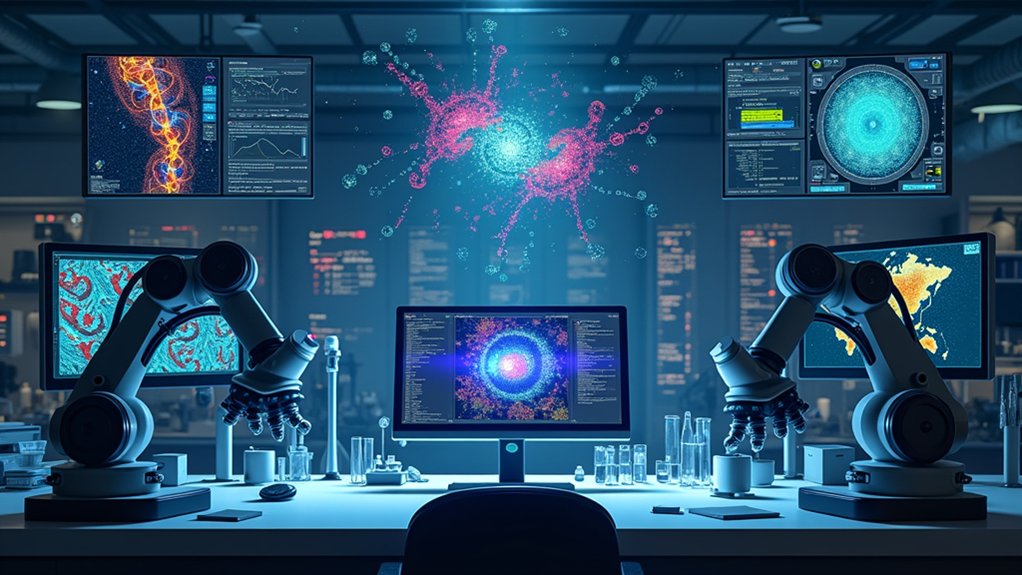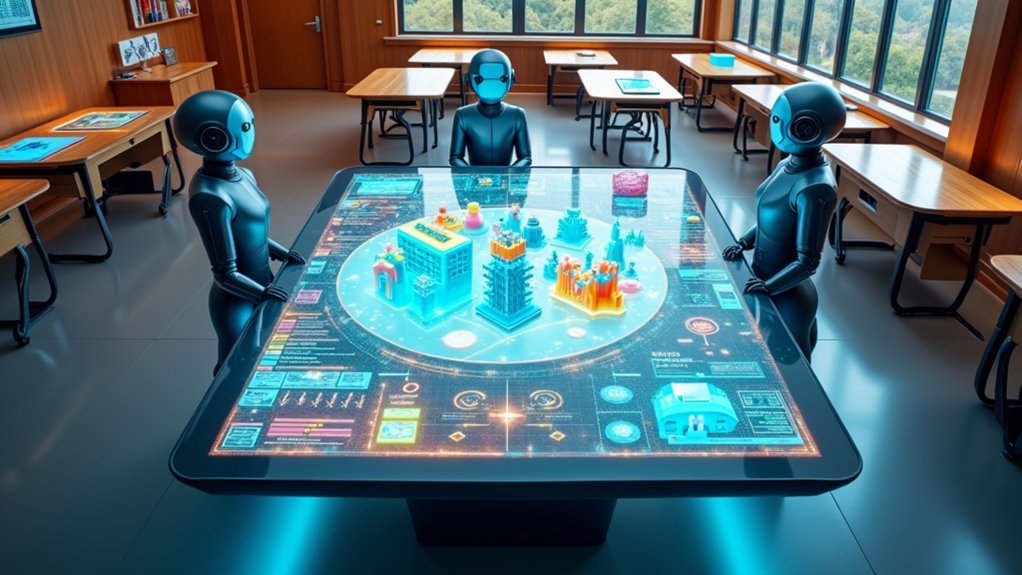AI research spans multiple fields including scientific discovery, healthcare, and national security. Tools like AlphaFold predict protein structures while healthcare AI could save $360 billion annually. The U.S. military has invested $1 billion in AI drones, raising ethical concerns. Both private companies and universities collaborate on AI advances, with specialized hardware enhancing performance. Ethical frameworks and governance remain essential as AI's influence continues to expand throughout society.

Innovation in artificial intelligence is reshaping scientific discovery, healthcare, national security, and many other fields. Recent advancements show how AI is becoming more capable of handling multiple types of information at once. New systems can process text, audio, and images together, making them more versatile for complex tasks.
AI is transforming industries by processing multiple information types simultaneously for more complex problem-solving.
The scientific community has embraced AI in remarkable ways. AlphaFold, an AI tool that predicts protein structures, earned a Nobel Prize. Materials science researchers are now using similar approaches with projects like LeMaterial. These tools help scientists analyze data and run experiments more efficiently. Some experts believe AI could soon function as a "virtual biologist" in labs. In astronomy, AI has revolutionized the search for celestial bodies by enabling exoplanet detection through advanced analysis of light curve data.
In healthcare, AI is making a significant impact. About 25% of healthcare work could be automated by AI technologies. This could save around $360 billion annually within five years. The FDA has already approved more than 650 AI-enabled medical devices. These tools help doctors detect cancer earlier and create better treatment plans.
National security agencies are investing heavily in AI. The US military has put $1 billion into AI-powered small drones. Defense companies are using classified data to train specialized AI systems. Many commercial AI companies are now seeking military contracts, raising important ethical questions.
As AI becomes more powerful, ethics and governance have become vital concerns. According to Russell and Norvig's comprehensive overview, addressing ethical implications is essential for responsible AI development. Experts call for international cooperation on AI research. Schools are adding AI ethics to their teaching programs. Researchers are working to reduce bias in AI systems and guarantee they're fair for everyone.
The research community itself is changing. More AI research happens in companies rather than universities. Scientists from different fields must work together to advance AI. Research papers spread quickly through online platforms, and review processes are evolving to keep pace.
Hardware development is essential for AI progress. New specialized chips help AI run more efficiently. AI applications are expected to generate long-term productivity potential of approximately $4.4 trillion. Cloud companies offer powerful AI infrastructure, while quantum computing might soon enhance specific AI applications.
Frequently Asked Questions
How Do AI Ethics Impact Decision-Making Processes?
AI ethics impact decision-making by requiring transparency in how AI reaches conclusions.
Companies must guarantee their systems don't show bias against certain groups.
Privacy concerns force careful handling of personal data.
Accountability questions affect who's responsible when AI makes mistakes.
These ethical considerations often slow down implementation as organizations work to address these issues before deploying AI solutions.
What Role Does Quantum Computing Play in Advancing AI?
Quantum computing is speeding up AI by processing huge amounts of data faster than regular computers.
It's like having a super-calculator that can think about many problems at once. Scientists have already built machines with over 100 quantum bits, or "qubits."
These systems help create better AI for drug discovery, weather forecasting, and traffic management.
However, challenges with error correction and system stability still need to be solved.
How Does Bias in Training Data Affect AI Outcomes?
Bias in training data directly shapes AI outcomes.
AI systems learn patterns from data that contains historical prejudices and uneven representation of different groups. These biases get built into algorithms, leading to unfair results.
For example, facial recognition systems often work less accurately for women and people of color. When AI makes decisions about loans, hiring, or criminal risk, these biases can harm minority groups and deepen social inequality.
Can AI Develop True Consciousness or Self-Awareness?
Scientists remain divided on whether AI can develop true consciousness. Current AI systems don't show genuine self-awareness, only programmed responses.
Some experts argue consciousness might emerge from complex information processing, while others believe biological brains are necessary. The "hard problem" of consciousness hasn't been solved scientifically.
Without clear definitions or tests for machine consciousness, researchers can't confirm if AI will ever truly experience awareness.
How Are AI Breakthroughs Translated Into Commercial Applications?
AI breakthroughs reach businesses through several paths. Research institutions partner with companies to license new AI technologies. Startups form to commercialize academic discoveries, and are often acquired by tech giants.
Industries like healthcare use AI for medical imaging, while finance applies it to fraud detection. The process isn't easy, though. Companies must adapt theoretical models for real-world use, guarantee regulatory compliance, and address ethical concerns.









